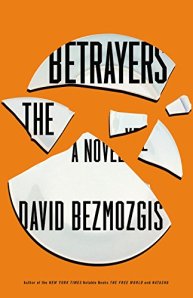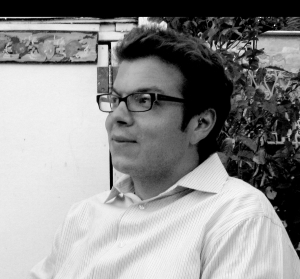
“The Betrayers succeeds by combining thought provoking ethical dilemmas with dramatic tension in an engaging prose style and is enthusiastically recommended.” - from my New York Journal of Books review (which includes spoilers). For additional remarks, excerpts, and an exploration of the novel as a roman a clef see my examiner article, which begins with the next paragraph.
Jewish books: David Bezmozgis' roman a clef second novel The Betrayers succeeds
Encyclopaedia Britannica defines "roman à clef, ( French: 'novel with a key')" as a "novel that has the extraliterary interest of portraying well-known real people more or less thinly disguised as fictional characters." In my New York Journal of Books review (which includes spoilers) of David Bezmozgis' second novel The Betrayers (which will be published by Little Brown on September 23, 2014) I describe its protagonist Baruch Kotler as combining "some aspects of Israeli foreign minister Avigdor Lieberman and even more of those of Soviet dissident turned Israeli politician turned NGO executive Natan Sharansky."
Let's explore the similarities and differences between these fictional and real life men. Like Sharansky, Kotler is short and bald, was a human rights activist in the USSR who sought the right to emigrate to Israel, was sentenced to 13 years imprisonment in the Soviet Gulag (Kotler serves all 13 years but Sharansky was released after nine years in a prisoner swap) which separated him from his wife who had already emigrated, upon his release emigrated to Israel and became a successful politician leading a political party representing a voting bloc of fellow Russian immigrants. Kotler remains in politics in 2014 while in real life Sharansky left politics in 2006. Avigdor Lieberman filled the vacuum created by Sharansky's exit from politics and created his own political party which won the allegiance of the same Russian immigrant voters who had previously supported Sharansky. Like Sharansky, Kotler is a saintly idealist, but unlike Sharansky (as far as we know) the fictional Kotler is also an adulterer. Unlike Sharansky, and like Lieberman, Kotler stood trial in Israel and was exonerated. Kotler is six years younger than Sharansky and four years older than Lieberman.
In my NYJB review I advise liberal readers to "ignore or overlook the protagonist’s right-wing Zionist politics; the correctness of his principles matters less than his steadfastness in standing by them." It is interesting to note how in a swing of the political pendulum many post-Communist Russian gentiles have become conservative Christians and likewise many Russian Jews (both in the diaspora and in Israel) have become right-wing Zionists.
Bezmozgis uses a Russian television game show to represent the vacuousness of contemporary Russian popular culture: "This is what they had raised from the scraps of communism. This was what the struggle for freedom and democracy had delivered. Bread and circuses. Mostly circuses. From one grand deception to another was their lot. First the Soviet sham, then the capitalist. For the ordinary citizen, these were just two different varieties of poison. The current variety served in a nicer bottle."
The novel's title refers not only to Kotler's adultery but also to the supposed friend who decades earlier had denounced Kotler to the KGB. In this book about moral choices Kotler, who refuses to be politcally blackmailed, advises his son who contemplates disobeying a military order he considers immoral, "If you think you have no choice, look harder. There is always a choice. A third way, if not a fourth. Whether we have the strength to make those choices is another matter. Of which I am no less guilty than anyone else."
The advance uncorrected proof of The Betrayers refers to the novel's venue as “Yalta, Crimea, Ukraine” and the date as summer 2014, but in the real world Crimea was invaded and annexed by Russia in March 2014. In an afterward Bezmozgis acknowledges “Clearly setting my novel in the summer of 2014, as I intended, is no longer feasible. I will have to find another solution.” It will be interesting to see what that solution looks like in the published edition.
For a fuller discussion of the novel see my NYJB review, which concludes, "The Betrayers succeeds by combining thought provoking ethical dilemmas with dramatic tension in an engaging prose style and is enthusiastically recommended."
 David Bezmozgis
David Bezmozgis

